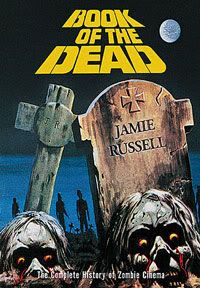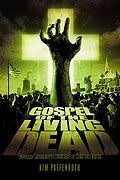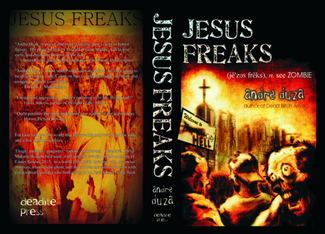Kim Paffenroth’s Gospel of the Dead: George Romero’s Visions of Hell on Earth, despite not being a particularly difficult read, has turned out to be a difficult book to review. If you’re basing whether or not you want to read it solely on its title, you might find yourself a little misled. Written by a theology professor in the Department of Religious Studies at Iona College, a Catholic university, and published by Baylor University Press, a Baptist academy (part of whose mission is “to serve the academic community by producing works of excellent quality that integrate faith and understanding”)—this book is clearly a theological work but only seems so peripherally. The book is made up of an Introduction, a Conclusion, and five chapters in between, each dedicated to a particular film; each chapter contains a synopsis of the film, analysis, and conclusion.
Paffenroth spends a lot of time analyzing sexism and racism (touching briefly on homophobia in Chapter 4) from a socio-psycho analytical perspective. He occasionally refers to these unfortunate human tendencies in the faith-based language of “sinful” and talks about things “divine.” But other than that, you could read about 85% of this book and not think twice about religion. And then he hits you with it, and if you’re not what he calls a “believer” in the Christian sense, frankly, you might feel a little uncomfortable, if not downright insulted. Many of the arguments made against rationalism and for faith could be easily flipped and made against faith and for rationalism, but much of the thrust of the religious criticism is based on pointing out all that is bad with logic and reason, and insisting that the problems that we face with our human faults and difficulties can somehow be solved through faith.
For example, in the first chapter that covers Night of the Living Dead, while we can all acknowledge that due to the characters’ inability to conquer these regrettable natural vices we all have, the characters are equally unable to come together and succeed against seemingly insurmountable odds. Paffenroth assumes that the characters (and assuming other residents of the area trapped in their own houses and attempting to get to rescue stations) basically put all of their eggs in the basket of reason, and therefore, they all die in the end. These characters bickered with each other and were guilty of the sins of pride, vanity, greed, domination, anger, hatred, etc. What isn’t provided is an alternative vision of what the film would have been if based entirely on faith. Instead of people who rely on logic for their survival, let’s make each character a church-goer—but to make it realistic, let’s make them members of different Christian denominations. Now, do we still think that faith will bring these people together and they will somehow survive? Or is physical survival not the point? The book fails to point out how faith would have made for a different conclusion. Though Paffenroth says that religion doesn’t promise physical safety, the general populace of “believers” mostly don’t feel that way, as shown in various tragic disasters. Hundreds may die, but survivors will credit God for their personal physical safety through a “miracle.” So, in those more practical terms, how exactly could faith have saved the characters in Night? To say that the characters were unable to act in a decent, moral manner due to their lack of faith is quite assumptive and completely rules out the facts of morality through means other than faith. Yes, people of reason act badly, but as history has shown us, so do people of faith.
In addition to the failure to take reality into account, Paffenroth also refrains from giving all the important details in some cases. In the case of Ben in Night, he accuses him of not wanting to go into the basement because he is proud of the work he’s done at boarding up windows and doors—hence he’s guilty of being vain. When I watch the film, I can clearly see (and hear in his argument with Cooper) that he doesn’t want to go into the cellar because it is a “death trap”—there’s no Plan B, no back-up escape route. Not the same thing at all. Similarly, he describes Kenneth in Dawn ‘04 as being callous for no reason other than a strong sense of individualism—not wanting to help out the group. It’s not until he has comprehensively defamed Kenneth in this way that Paffenroth off-handedly throws in, much, much later, the reality that this character was indeed looking for his brother, making him decidedly un-individualistic, unselfish, and while he might still be viewed in the beginning as callous, it is not for the reasons stated by Paffenroth.
These are a few examples as to how Paffenroth’s perspective, if being read from a secular perspective, might be difficult to swallow. This is not to say that the book isn’t worth reading, for much of the scrutiny, socially and psychologically, is quite good. Paffenroth bases much of his reading on previous scholarship on the films of Romero, and in that sense, some of it may not be new to the reader. That being said, there are few places one can look to find these thoughts laid out in such detail. Furthermore, Paffenroth’s analogous comparisons with Dante’s Inferno are as interesting as they are relevant, and for the most part, thankfully presented in a way that can be appreciated by both “believers” and non-believing students of literature and popular culture, which, to me, is what academic scholarship should be.
Gospel of the Dead can be contradictory in the sense that on one hand, the author champions the virtues of women’s rights, the rights of minorities, and their value in society (he even, contrary to what some secularists might find to be stereotypical Christian behavior, goes so far as to condemn homophobia), while on the other hand he downplays the benefits and good works of those who base their life and moral compasses on something other than religious doctrine. While women should be treated equally, and should have the autonomy to make the decision to have a child (as in Fran in Dawn ’78), he downplays any sense that women might equally have the autonomous right to terminate an unwanted pregnancy and control their own bodies. With these things in mind, when you open this book, you should be prepared for wonderful, insightful, and interesting analysis couched within a loose theological framework that, in the end, berates reason without faith, and certainly doesn’t entertain the idea that one can be good, and moral, without having to submit to any particular religion, especially Christianity. This makes Gospel of the Dead, while interesting and insightful in some areas, clearly written for a certain audience—Christians.
On another note, what makes the title particularly misleading, in my opinion, is that gives the impression that this is purely a study of director George Romero’s vision. Much of it is. However, the 2004 Dawn of the Dead remake is given its own chapter, whereas the 1990 Night of the Living Dead remake is not considered at all. The reason given for this is that the Night remake is practically identical to the original and doesn’t offer anything new to consider. This is surprising; most critics have observed numerous differences, some of them fundamental. Considering Paffenroth’s primary focus on sexism and racism, Night ’90 offers up significant material in these areas, especially when compared to the original, which is not only vastly different, but is from another time and, therefore, context. Here we are able to explore Barbara’s new role as a strong, gun-toting woman who is in control (indeed, the lone survivor), as opposed to the catatonic Barbara of the original, who succumbs to her own zombified brother after spending most of the film staring into space and playing with doilies. Also, in terms of racism, the relationship between Ben and Barbara can now be surveyed in the context of interracial relationships (romantic or otherwise) in the 1990’s, as opposed what was generally acceptable in the struggling Civil Rights era of the 1960’s. It seems to me that there is a lot to discover in these terms when considering Night ’90, and the movie is actually quite different than the original.
What Night ’90 does have in common with Romero’s other films which Dawn ’04 does not is an actual, direct connection with Romero himself. George Romero wrote and produced the Night remake, which, in my mind, makes this film closer to Romero’s creation and thus a continuation of the zombie mythos in evolutionary terms. The Dawn remake—though rife with very interesting commentary and analysis—is only very tenuously connected with Romero himself, or even the original film. The chapter on the Dawn remake, regardless of the film’s detachment from Romero’s direct influence, is still a very worthy chapter—its examination of the film is interesting and in many aspects, poignant. These positive attributes, however, don’t make it any more Romero’s work than Shaun of the Dead or any other film influenced by Romero (which is most zombie movies) could be, and would serve better as a separate piece. It would be my suggestion to cover Night, Dawn ’78, Day, Night ’90, and Land if one wanted to stay true to the title of the book, and completely faithful to Romero’s vision.
These criticisms, as I’ve stated before, do not make the book worthless, as it has many merits in the areas of social and psychological commentary. It’s written in a style that makes it accessible to fan’s and not just fellow professors, and can very easily spark off the average fans very real ability to carry out his or her own analysis of these films. However, the majority of average fans that love these films and know them well enough to partake and participate in this kind of deep thinking about them, according to a survey I recently conducted, are not particularly religious. While they lean prominently in the direction of non-racist, non-sexist, and non-homophobic in comparison to your average American, they do so based on morals either not connected with, or very loosely associated with, the Christian faith. Not all…just most. Because of that, some of the conclusions made throughout Gospel of the Dead in regards to secular thinkers might not come across as agreeable.
Review by Kriscinda Meadows.



